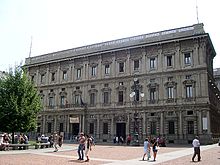City Council of Milan
| Consiglio Comunale di Milano | |
|---|---|
 |
|
| Type | |
| Type | |
| Leadership | |
|
President
|
Lamberto Bertolè, PD
Since 7 July 2016 |
| Structure | |
| Seats | 48 |
 |
|
|
Political groups
|
Opposition Parties |
| Elections | |
|
Last election
|
5 June 2016 |
|
Next election
|
No later than June 2021 |
| Meeting place | |
 |
|
| Palazzo Marino in Piazza della Scala | |
| Website | |
| Comune di Milano.it | |
Government (29)
Opposition Parties
The City Council of Milan (Italian: Consiglio Comunale di Milano ) is the top-tier administrative body of the municipality of Milan, Lombardy, Italy. It consists of the elected Mayor of Milan and an elected 48-member assembly. It represents a legislative body which can also control Mayor's policy guidelines and be able to enforce his resignation by a motion of no confidence.
The City Council is elected for a five-years term and is based on a direct choice for the candidate with a preference vote: the candidate with the majority of the preferences is elected. The number of the seats for each party is determined proportionally.
The City Council meets at Palazzo Marino, seated in Piazza della Scala.
The political system of the Comuni of Italy was changed in 1993, when a semi-presidential system for the mayoral election was introduced. If until that year the Council was elected under a pure proportional system and the Council had the power to elect and dismiss the Mayor of Milan, since 1993 the Mayor and the Council are jointly elected by citizens, with an electoral law that assures to the elected Mayor a political majority in the Council.
Under this system, the election of the Mayor is prior over the election of the Council. Voters express a direct choice for the Mayor or an indirect choice voting for the party of the candidate's coalition and this gives a result whereby the winning candidate is able to claim majority support in the new Council. The candidate who is elected Mayor has always a majority of 62% of seats (29 seats) in the City Council, which will support him during his term. The seats for each party of the coalition which wins the majority is determined proportionally.
In this type of system, the Council is generally elected for a five-year term, but, if the Mayor suffers a vote of no confidence, resigns or dies, under the simul stabunt, simul cadent clause introduced in 1993 (literally they will stand together or they will fall together), also the Council is dissolved and a snap election is called.
...
Wikipedia
